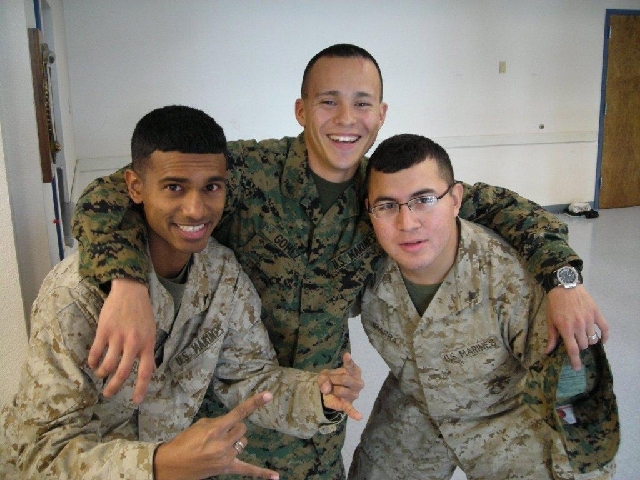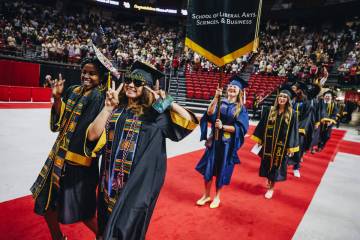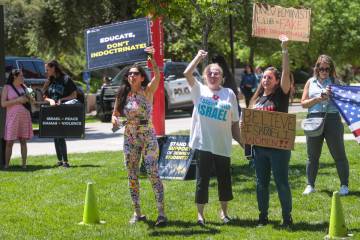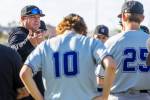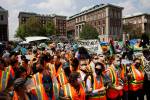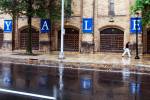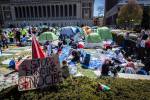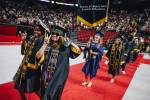CSN alumnus gets second master’s at Yale
As the Clark County School District prepares to go through thousands of applications to hire 1,700 new teachers before the fall, Reuben D’Silva’s ought to stand out.
The 28-year-old Marine, who received the Purple Heart after being injured in battle, will graduate this May with his second master’s degree from Yale. His first, which he finished in one academic year, was from another Ivy League member, the University of Pennsylvania.
But that’s not why.
D’Silva has already received solicitations from some of the finer private schools in New Haven and he has been encouraged to pursue a job with the United Nations.
That’s not why either.
D’Silva’s passion for education and sense of community are so evident in his still young life that his resume reads like a novel, featuring a super smart and — did we mention also humble — superhero.
“I love Nevada. I love my home,” he said in a recent interview from Yale. “What I feel in my heart is to come back to Las Vegas and try to get a job in the school district. There are no guarantees.”
His story begins in Bombay, India, where he was born and lived one year before his parents moved the family to the United States for economic opportunities.
If his application is successful to get hired as a social studies teacher, D’Silva will join his mother in the Clark County School District, where she teaches second grade at Tom Williams Elementary School.
A graduate of Rancho High School, D’Silva grew up in Las Vegas.
Carlos Ezeta, a soccer coach, counselor and teacher at Rancho at the time, recalled how active D’Silva was in high school, where he coached him in soccer and taught all of the D’Silva children.
“I recall his amazing ability to adapt and integrate himself into any challenge, whether it was a rough strenuous physical practice or mental preparedness. Reuben always did his duties with a smile,” said Ezeta, who has known D’Silva for 14 years.
Ezeta became a counselor at the College of Southern Nevada, where D’Silva enrolled after high school. He had applied to colleges around the nation, but none provided enough financial aid . Rather than take out loans and get into debt, he went local.
“I am really happy I went to CSN as opposed to going straight into a four-year school,” he said. “It helped me hone my academic skills. I really wasn’t ready when I first got out of high school.”
At CSN, he was surrounded by high school friends, faculty who cared about him and Ezeta, his counselor with whom he still keeps in touch.
“His capacity to comprehend things fast and easy made his presence at CSN electric and illuminated for other students,” Ezeta said. “CSN was a stepping stone to Yale or anywhere Reuben wanted to go.”
“And by the way, he got accepted to multiple Ivy Leagues,” Ezeta added with pride.
From CSN, where he spent two years and graduated with his Associate of Arts in December of 2005, D’Silva transferred to the University of Nevada, Las Vegas. Along the way, he joined the U.S. Marine Reserves, even though he was not a U.S. citizen, out of a sense of obligation to give back to a country that had given him so much.
He met Marcos Ibarra, a fellow UNLV student, in training with the 6th Motor Transport Battalion in 2005 and they’ve been close friends ever since.
“We pledged fraternity at the same time, and that brought us closer,” D’Silva said. “We were learning the Greek alphabet together during training. We’ve been friends ever since.”
In February 2007, D’Silva and Ibarra, who now works for Senate Majority Leader Harry Reid in Las Vegas, were stationed in Iraq.
Several months later, they were driving a truckload of bottled water as part of a supply convoy through the city of Fallujah. D’Silva was manning the turret gun on top of the vehicle. Ibarra was three cars behind him and did not see the sniper emerge from a nearby apartment window.
The shooter yelled at D’Silva in Arabic and began firing. A bullet struck D’Silva’s left arm, severing a nerve.
The typical military response would have been for D’Silva’s entire convey, including the truck with the grenade launcher, to return heavy, overwhelming, fire power on the sniper. But that didn’t happen.
“I shot back with my M-4 rifle in order to draw less attention,” he said. “If the Marine with the grenade launcher opened up on the building, he would have completely destroyed it. This would also mean that he would more than likely kill everyone inside.”
In fact, Ibarra and others were unaware that D’Silva had been shot. Electronic counter measures used to protect each vehicle against improvised explosive devices had blocked their radio signals and made communication between vehicles nearly impossible as they moved slowly through the city.
When Ibarra’s vehicle pulled up to D’Silva’s truck outside of Falluja, Ibarra first noticed the blood.
“At the time, I didn’t know where he had been shot, and I, along with my fellow Marines, were furious. It’s not every day one of your own is shot, and it puts everything into perspective,” Ibarra said. “I think I came to grips with my mortality on that night. Reuben was swiftly transferred to a HMMV (high mobility military vehicle) because it moved faster to the base hospital. It was the last time I saw Reuben until we came back stateside.”
D’Silva was transported by medevac helicopter to a hospital in Iraq where he spent a few days. “There were 80 of us. They had us stacked up in little beds. This was in the middle of the surge, and we had had a tremendous spike in casualties at the time.”
Even so, D’Silva recalled feeling sadness about leaving Iraq without his platoon. “They were my only family there. I did not want to leave my boys.”
He was taken to the Bob Wilson Naval Hospital in San Diego, where he spent the next year recovering and trying to move the fingers on his left hand.
“My arm was totally disabled. I still don’t have full use of my hand; but I’m now able to function, and they didn’t have to take my arm off,” he said.
D’Silva received a Purple Heart for his bravery and was naturalized as a U.S. citizen later that year at Nellis Air Force Base.
In 2008, he came back to UNLV to complete his degree in history.
“I really tried to be involved and just enjoy being home and a real college student instead of being at war,” he said.
D’Silva graduated with his bachelor’s degree in 2010 and wanted to apply with the school district. But in the height of the great recession, he did not like his odds of being hired to teach social studies.
So he looked into getting his master’s degree and applied to various programs throughout the country. Columbia University was his first choice. He wanted to study with professor Eric Foner, whose most recent book, “The Fiery Trial: Abraham Lincoln and American Slavery,” won the Pulitzer, Bancroft and Lincoln prizes in 2011.
D’Silva got in.
But — always practical — he found the cost-of-living in New York City less than desirable. So he went to the University of Pennsylvania in Philadelphia.
He was in his first few months of studying globalization and religion when he realized Yale professors were producing most of the research he was studying and Yale was where he really needed to be.
So, D’Silva wrapped up the two-year master’s degree in nine months, applied to Yale, got in and will graduate this month with a Master of Arts in religion.
At Yale, D’Silva has taken classes by world leaders, including former Prime Minister Tony Blair and recently retired Ambassador to Afghanistan Ryan Crocker. D’Silva has been mentored by Yale professor of aerospace studies Col. Scott Manning and Dr. Elijah Anderson, a sociology professor and one of the nation’s leading urban ethnographers and cultural theorists.
Now, he’s ready to come home.
Some have called him “stupid” for not taking advantage of the networks he has built at Yale and urged him to pursue a career with the United Nations in policy analysis.
“I just don’t feel it in my heart,” he said. “And I don’t think I would make as much of a difference as I can if I come back to Las Vegas and taught in the inner city where I grew up. I think that would be really great.”



